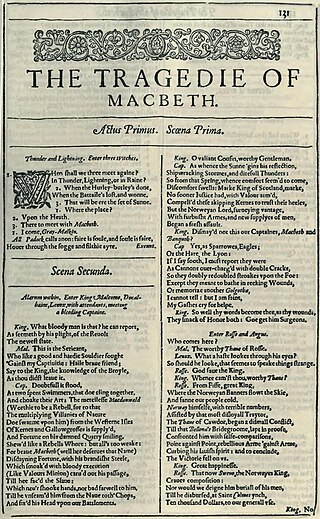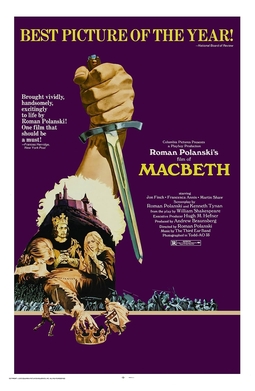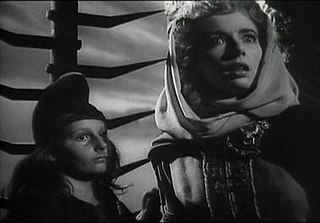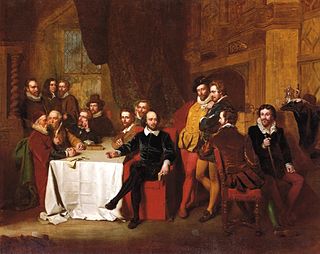Related Research Articles

The Tragedy of Macbeth, often shortened to Macbeth, is a tragedy by William Shakespeare. It is thought to have been first performed in 1606. It dramatises the damaging physical and psychological effects of political ambition on those who seek power. Of all the plays that Shakespeare wrote during the reign of James I, Macbeth most clearly reflects his relationship with King James, patron of Shakespeare's acting company. It was first published in the Folio of 1623, possibly from a prompt book, and is Shakespeare's shortest tragedy.

Thomas Penson De Quincey was an English writer, essayist, and literary critic, best known for his Confessions of an English Opium-Eater (1821). Many scholars suggest that in publishing this work De Quincey inaugurated the tradition of addiction literature in the West.
This article contains information about the literary events and publications of 1823.

Macbeth is a 1971 historical drama film directed by Roman Polanski, and co-written by Polanski and Kenneth Tynan. A film adaptation of William Shakespeare's tragedy of the same name, it tells the story of the Highland lord who becomes King of Scotland through treachery and murder. Jon Finch and Francesca Annis star as the title character and his wife, noted for their relative youth as actors. Themes of historic recurrence, greater pessimism and internal ugliness in physically beautiful characters are added to Shakespeare's story of moral decline, which is presented in a more realistic style.

In his own time, William Shakespeare (1564–1616) was rated as merely one among many talented playwrights and poets, but since the late 17th century has been considered the supreme playwright and poet of the English language.

Confessions of an English Opium-Eater (1821) is an autobiographical account written by Thomas De Quincey, about his laudanum addiction and its effect on his life. The Confessions was "the first major work De Quincey published and the one that won him fame almost overnight".

Macbeth is an opera in four acts by Giuseppe Verdi, with an Italian libretto by Francesco Maria Piave and additions by Andrea Maffei, based on William Shakespeare's play of the same name. Written for the Teatro della Pergola in Florence, Macbeth was Verdi's tenth opera and premiered on 14 March 1847. It was the first Shakespeare play that Verdi adapted for the operatic stage. Almost twenty years later, Macbeth was revised and expanded into a French version and given in Paris on 21 April 1865.

Macbeth is a 1948 American historical drama directed by Orson Welles. A film adaptation of William Shakespeare's tragedy of the same name, it tells the story of the Scottish general who becomes the King of Scotland through treachery and murder. The film stars Welles in the lead role and Jeanette Nolan as Lady Macbeth.

Lady Macduff is a character in William Shakespeare's Macbeth. She is married to Lord Macduff, the Thane of Fife. Her appearance in the play is brief: she and her son are introduced in Act IV Scene II, a climactic scene that ends with both of them being murdered on Macbeth's orders. Though Lady Macduff's appearance is limited to this scene, her role in the play is quite significant. Later playwrights, William Davenant especially, expanded her role in adaptation and in performance.

Blackwood's Magazine was a British magazine and miscellany printed between 1817 and 1980. It was founded by the publisher William Blackwood and was originally called the Edinburgh Monthly Magazine. The first number appeared in April 1817 under the editorship of Thomas Pringle and James Cleghorn. The journal was unsuccessful and Blackwood fired Pringle and Cleghorn and relaunched the journal as Blackwood's Edinburgh Magazine under his own editorship. The journal eventually adopted the shorter name and from the relaunch often referred to itself as Maga. The title page bore the image of George Buchanan, a 16th-century Scottish historian, religious and political thinker.
Events from the year 1823 in the United Kingdom.
Robert J. H. Morrison is a Canadian author, editor, and academic. He is British Academy Global Professor at Bath Spa University and Queen's National Scholar at Queen's University, Kingston, Ontario. A scholar of late eighteenth- and nineteenth-century literature and culture, he is particularly interested in the Regency years (1811–1820), Blackwood's Edinburgh Magazine, Jane Austen, and Thomas De Quincey.

William Shakespeare's style of writing was borrowed from the conventions of the day and adapted to his needs.
"On Murder Considered as one of the Fine Arts" are a trilogy of essays by Thomas De Quincey begun in 1827. The essays are a satirical account of a gentleman's club that celebrates homicide from an aesthetic perspective. The Ratcliff Highway murders committed by John Williams in 1811 are a keystone throughout the series.
The English Mail-Coach is an essay by the English author Thomas De Quincey. A "three-part masterpiece" and "one of his most magnificent works," it first appeared in 1849 in Blackwood's Edinburgh Magazine, in the October and December issues.

Suspiria de profundis is a collection of essays in the form of prose poems by English writer Thomas De Quincey, first published in 1845. An examination of the process of memory as influenced by hallucinogenic drug use, Suspiria has been described as one of the best-known and most distinctive literary works of its era.
Tait's Edinburgh Magazine was a monthly periodical founded in 1832. It was an important venue for liberal political views, as well as contemporary cultural and literary developments, in early-to-mid-nineteenth century Britain.

The Voodoo Macbeth is a common nickname for the Federal Theatre Project's 1936 New York production of William Shakespeare's Macbeth. Orson Welles adapted and directed the production, moved the play's setting from Scotland to a fictional Caribbean island, recruited an entirely Black cast, and earned the nickname for his production from the Haitian vodou that fulfilled the role of Scottish witchcraft. A box office sensation, the production is regarded as a landmark theatrical event for several reasons: its innovative interpretation of the play, its success in promoting African-American theatre, and its role in securing the reputation of its 20-year-old director.

This is a bibliography of works by Thomas De Quincey, a romantic English writer. Chiefly remembered today for his Confessions of an English Opium-Eater (1821), De Quincey's oeuvre includes literary criticism, poetry, and a large selection of reviews, translations and journalism. His private correspondence and diary have also been published.

The Third Murderer is a character in William Shakespeare's tragedy Macbeth (1606). He appears in one scene (3.3), joining the First and Second Murderers to assassinate Banquo and Fleance, at the orders of Macbeth.
References
- ↑ The signature was one of De Quincey's favorites, used in both Opium Eater essays and personal letters alike. On Murder (Oxford University Press, 2009. 167).
- 1 2 De Quincey, Thomas. "On the Knocking at the Gate in Macbeth", London Magazine October, 1823. 349–356.
- ↑ Darley, George (as John Lacy). "A Third Letter to the Dramatists of the Day", London Magazine. September, 1823. 275–283.
- ↑ Quincey, Thomas de. On Murder. Edited by Robert Morrison. Oxford University Press, 2009.
- 1 2 Lyon, Judson S. Thomas De Quincey . Twayne's English Author Series. Twayne, 1969.
- ↑ Halliday, F.E. A Shakespeare Companion 1564–1964 . Penguin, 1964. 132.
- ↑ Hughes, Thomas. (1882). Memoir of Daniel Macmillan . Macmillan and Company, 1882. 141.
- ↑ Horace Ainsworth Eaton, Thomas De Quincey: A Biography, Oxford, Oxford University Press, 1936; New York, Octagon Press, 1972; p. 275.